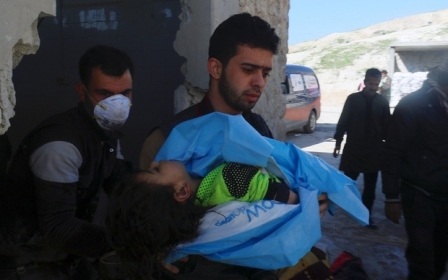UK accuses Russia of 'cover up' over Syria's chemical weapons use

British Foreign Secretary Boris Johnson on Friday accused Russia of trying to hide the use of sarin gas by Syrian president Bashar al-Assad's government, and said Moscow's behaviour was undermining the consensus against chemical weapons.
A United Nations report released on Thursday found Assad's government to blame for a chemical attack in Khan Sheikhoun, Syria which killed dozens of people in April and prompted a retaliatory US missile strike.
Commenting on the release of that report, Johnson called on the international community to hold Assad's government to account.
He also launched a fierce attack on Russia, which helped broker a deal in 2013 under which Assad agreed to destroy Syria's chemical weapon stockpile.
I call on Russia to stop covering up for its abhorrent ally and keep its own commitment to ensure that chemical weapons are never used again
– Boris Johnson, UK foreign secretary
"Russia has repeatedly attempted to disrupt efforts to get to the truth of the Khan Sheikhoun attack," he said in a statement. "Russia has consistently chosen to cover up for Assad."
"This behaviour can only undermine the global consensus against the use of chemical weapons. I call on Russia to stop covering up for its abhorrent ally and keep its own commitment to ensure that chemical weapons are never used again."
Russia has defended the Syrian leader against US allegations that his forces carried out the attack, saying there was no evidence. Russia said the chemicals that killed civilians belonged to rebels, not Assad's government.
On Friday, Moscow criticised the UN report, with a deputy foreign minister saying it contained inconsistencies and unverified evidence.
"Even the first cursory read shows that many inconsistencies, logical discrepancies, using doubtful witness accounts and unverified evidence... all of this is still [in the report]," Deputy Foreign Minister Sergei Ryabkov told Interfax news agency.
Ryabkov said other nations were seeking to use the report to "resolve their own strategic geopolitical issues in Syria".
Russia would analyse the findings and publish a response soon, he added.
The Syrian government has repeatedly denied using chemical weapons during the country's more than six-year civil war.
The chemical weapons investigation mechanism was unanimously created by the 15-member UN Security Council, which includes Russia, in 2015 and renewed in 2016 for another year. Its mandate is due to expire in mid-November, and Russia on Tuesday vetoed a proposal to further extend its mandate.
Russian ambassador to the UN Vassily Nebenzia said Russia would consider revisiting the mandate extension after Thursday's report was discussed.
Human Rights Watch on Friday urged the international community to slap new sanctions on the Syrian government.
"The Security Council should move swiftly to ensure accountability by imposing sanctions on individuals and entities responsible for chemical attacks in Syria," it said.
Stay informed with MEE's newsletters
Sign up to get the latest alerts, insights and analysis, starting with Turkey Unpacked
Middle East Eye delivers independent and unrivalled coverage and analysis of the Middle East, North Africa and beyond. To learn more about republishing this content and the associated fees, please fill out this form. More about MEE can be found here.




